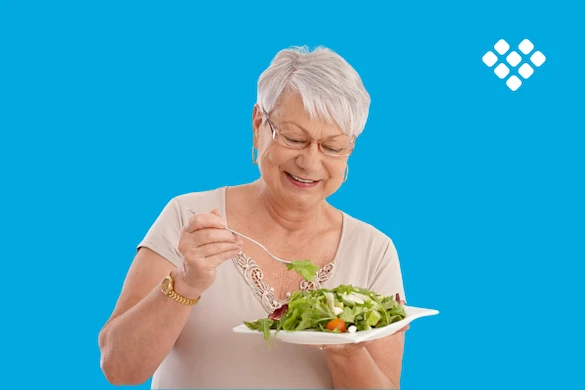Guide to Senior Nutrition & Weight Management
One of the biggest issues with aging is gaining and losing weight. Read our guide to learn ways for seniors to better manage weight.

Weight management is a vital component of overall health and well-being, particularly for older adults. Aging often brings changes in metabolism, appetite, and physical activity levels, all of which can impact weight and nutrition. Whether the goal is to gain weight after unintentional loss or to maintain a healthy weight, adopting effective strategies is crucial for improving quality of life.
At Senior Care Finder, we understand how difficult it can be for caregivers and the elderly to manage these changes in the body. This guide outlines the best trends for elderly people to gain or manage their weight safely and sustainably, while also explaining the reasons for the changes and how our environment plays a part.
Key Takeaways



Understanding Senior Weight Management
Proper weight management can be just as difficult as it is important for people of all ages. As we age, our metabolism changes and causes unintentional weight loss for older adults. This can be seen after loss of appetite, difficulty leaving the house to buy food, pain when chewing or swallowing food, or simply forgetting to eat.
Maintaining a healthy weight can prevent complications such as muscle frailty, decreased mobility, and increased susceptibility to illnesses. For overweight seniors, weight management reduces the risk of conditions like diabetes, heart disease, and joint issues. Conversely, underweight seniors may face nutritional deficiencies and weakened immunity.
Aging alone can lead to reduced muscle mass and slower metabolism, making weight management challenging. Dental issues, chronic illnesses, and medication side effects can further complicate eating habits and nutrient absorption.
Healthy Strategies for Gaining Weight
Seniors looking to gain weight should prioritize nutrient-dense foods. These include whole grains, lean proteins, healthy fats, and a variety of fruits and vegetables. Adding calorie-dense but nutritious items like avocados, nuts, seeds, and olive oil can help increase caloric intake without sacrificing nutritional value. Explore our list of nutrient-dense foods, each of which also provides cognitive benefits.
Eating small, frequent meals throughout the day can help seniors meet their caloric needs without feeling overwhelmed. This approach is particularly useful for those with reduced appetites or digestive issues.
Incorporating healthy high-calorie snacks can provide an energy boost between meals, and improve the variety and enjoyment of a senior’s diet. These snacks might include:
- Trail mix
- Yogurt
- Cheese
- Smoothies made with protein powder
- Fruits
- Nut butter and wheat bread
Safe Weight Loss and Maintenance Tips
For overweight seniors, a balanced diet that emphasizes portion control can help achieve gradual weight loss. Focusing on lean proteins, whole grains, and fiber-rich foods ensures nutrient needs are met while reducing calorie intake.
Exercise is key to maintaining or healthily losing weight. Activities like walking, swimming, and strength training not only burn calories, but also improve muscle mass, balance, and overall health. If seniors don’t have the budget for special exercise equipment or access to special environments, here are some ideas to stay active for free:
- Use soup cans, bottles of water, or other household items as weights
- Try out free demonstration exercise classes at your local senior center or fitness center
- Go for a hike in a park
- Participate in community-sponsored fun runs or walks
- Participate in yard work such as raking, digging and planting
Seniors should aim for at least 150 minutes of moderate exercise per week, as recommended by health guidelines. You don’t have to accomplish activity all at once—instead you can break up your activity over the course of seven days. Try an activity from our list of 5 Engaging Home Activities, especially if you have alzheimer’s or dementia.
Limiting foods and beverages high in added sugars and unhealthy fats, such as sugary drinks, processed snacks, and fried foods, is essential for weight loss and maintenance. Replacing these with healthier alternatives can make a significant difference.
Watch for Hidden Health Issues
There are several chronic conditions that impact weight management as you age including diabetes, heart disease, and gastrointestinal disorders. Work closely with healthcare providers to manage these conditions and to ensure that dietary strategies align with medical needs.
Regular check-ups with doctors and dietitians can help identify potential barriers to healthy weight management. They can recommend tailored nutritional plans and address underlying health concerns, such as thyroid imbalances or malabsorption issues.
Certain medications can cause weight gain or loss as a side effect. Seniors should discuss any significant changes in weight with their healthcare provider to determine whether medications need to be adjusted.
Hydration and Supplements for Older Adults
Dehydration can exacerbate health issues and suppress appetite. Seniors should aim to drink plenty of water throughout the day and include hydrating foods like soups, fruits and vegetables in their diet.
In some cases, supplements like protein powders, meal replacement shakes, or vitamin and mineral supplements can help fill nutritional gaps. However, these should be used under the guidance of a healthcare professional to avoid over-supplementation or interactions with medications.
Building a Supportive Environment
Mealtime can be more enjoyable and stimulating when shared with others. Seniors who dine with friends or family often eat more and have improved nutritional intake. Community programs and senior centers can also provide opportunities for shared meals.
Family members can play a critical role in encouraging healthy eating habits by assisting with meal preparation, grocery shopping, and planning balanced diets. Positive reinforcement and understanding of dietary needs can make the process more effective.
Engaging with dietitians, nutritionists, or personal trainers can provide seniors with expert advice and motivation. These professionals can create personalized plans that address specific goals and health concerns.
Weight management for seniors requires a holistic and individualized approach. Whether the goal is to gain weight or maintain a healthy balance, strategies like nutrient-dense eating, regular physical activity, and addressing underlying health issues are crucial. By staying hydrated, seeking professional guidance, and fostering supportive environments, seniors can achieve and sustain their weight goals, ultimately enhancing their quality of life.
Conclusion
Weight management is a crucial aspect of healthy aging, requiring a balanced approach that addresses changing metabolism, appetite, and physical activity. Seniors can achieve safe and sustainable weight gain or loss by focusing on nutrient-dense foods, regular exercise, and hydration while managing underlying health issues. A supportive environment—whether through family, caregivers, or healthcare professionals—plays a vital role in maintaining good nutrition and overall well-being. With the right strategies and guidance, seniors can better manage their weight and enjoy a higher quality of life as they age.
Explore Senior Living Services Near You
For elderly individuals, it’s important to have the resources to find effective senior care services and senior living centers. Senior Care Finder is committed to providing all of the best resources to do this, by offering a wide range of resources in our directory. Explore our Services page to begin your search to find sustainable and affordable solutions for senior living.
About Senior Care Finder
Senior Care Finder simplifies the senior living search process by offering a transparent, ungated platform to explore all your options without middlemen or fees. Whether you’re looking for independent living, assisted living, or any other type of senior living or care, our platform empowers families to make informed decisions with ease.


